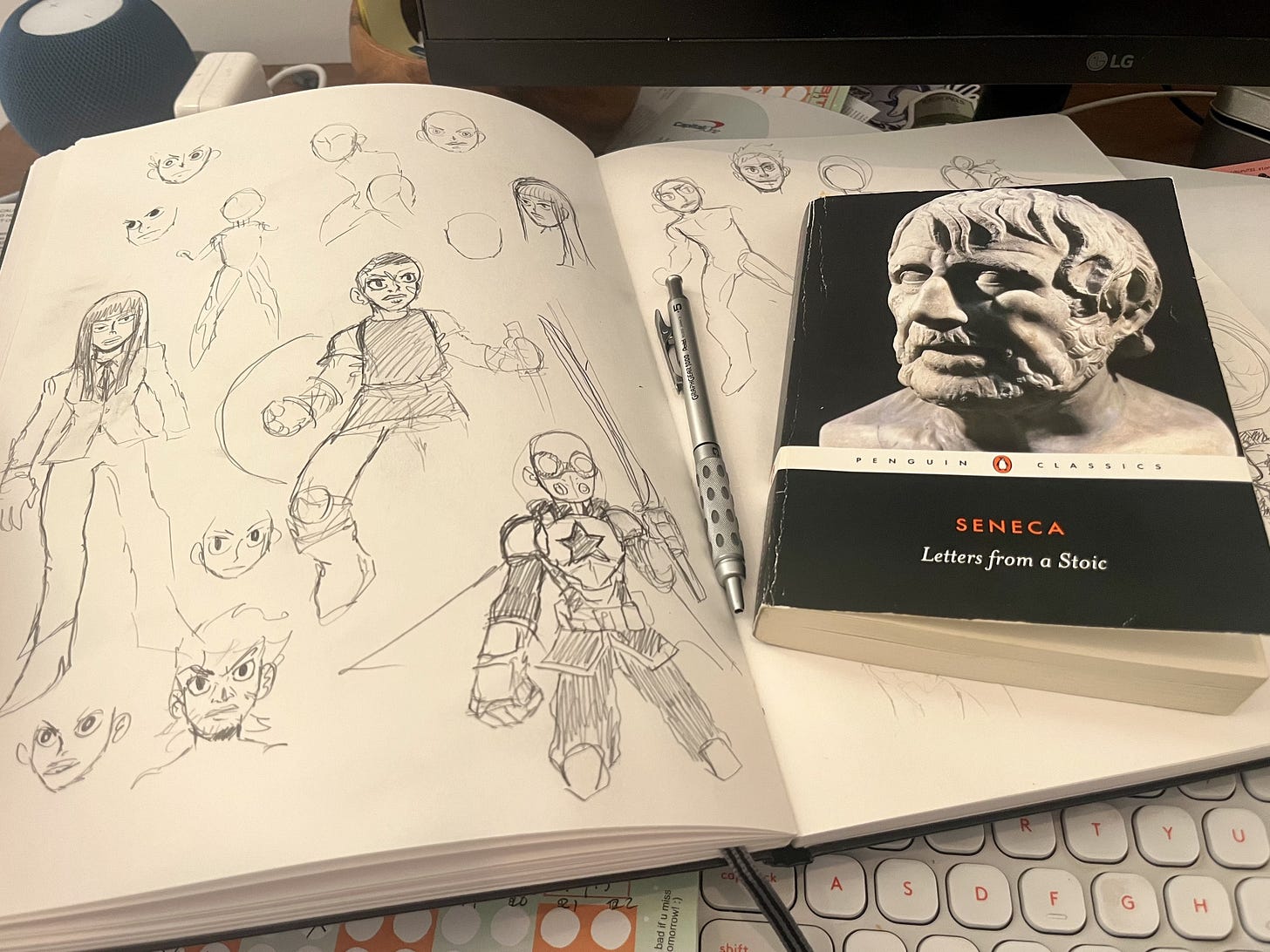Gutter Thoughts 032: How to promote yourself without losing your soul, according to Seneca
For creators who want to build an audience online without letting the algorithm dictate their art.
The Stoic Quote of the Week
“I am writing this,’ he says, ‘not for the eyes of the many, but for yours alone: for each of us is audience enough for the other.”
-Seneca quoting Epicurus
Hey there,
I’ve been reading Seneca again, and two of his letters hit me like a punch.
In one, he writes: “You ask me to say what you should consider it particularly important to avoid. My answer is this: a mass crowd.”
Avoid crowds?
That sounds impossible today. We live in them, online and off.
If you’re trying to get your comic noticed, sell your next zine, or share your art online, you have to step into the crowd.
But Seneca wasn’t warning against being seen. He was warning against being shaped by what everyone else sees.
As creators, we can’t avoid visibility. But we can choose how we move through it.
So here’s how to follow Seneca’s advice while still promoting your work with integrity, focus, and peace of mind.
Be cautious about what you consume.
One of my favorite teachers used to say: “Garbage in, garbage out.”
What you take in determines what you put out.
Seneca knew this long before the internet existed. He once stopped by the Roman arena expecting a light show and instead found blood and cheers. He left disgusted, not just by the violence but by the joy it gave people.
He wrote: “When a mind is impressionable and has not yet firmed its hold on what is right, it must be rescued from the crowd; it is so easy to go over to the majority.”
That line should hit every creator hard.
Because your work reflects what you feed your mind.
If your feed is full of trends, outrage, and “how to go viral” advice, don’t be surprised if your stories start to sound like everyone else’s.
So build a stronger creative diet:
Keep a comics library that challenges how you think about story and structure.
Follow artists who make you want to draw, not those who make you compare.
Log off when inspiration turns into imitation.
Your imagination is a garden. What you plant grows back onto the page.
Find other creators on the same path.
Avoiding crowds doesn’t mean staying alone. It means being intentional about who you share your time and energy with.
Seneca wrote: “Associate with people who are likely to improve you. Welcome those whom you are capable of improving.”
That’s not networking advice. That’s creative survival.
Making art—whether comics, design, or writing—is long, solitary work. If you don’t have people who get it, who know what it means to wrestle with a single panel for hours, it’s easy to drift off course.
Find the people who remind you why you create.
Here’s what helps:
Go to small press shows and meet other cartoonists who are building from scratch.
Read Chapter 6 of Scott McCloud’s Making Comics, Your Place in Comics. It’s a masterclass in finding where your work fits in the creative landscape.
Share your process. Teaching and talking through your work sharpens it.
I found my community at conventions and critique nights, where everyone was grinding on their own stories. Those friendships still push me to grow.
The crowd dulls your focus. The right peers sharpen it.
Take time to work in isolation.
Even in ancient Rome, Seneca saw distraction as a danger. He quoted Democritus: “A single man is a crowd, and a crowd is a single man.”
Solitude isn’t silence. It’s depth.
It’s the quiet space where ideas take shape.
Every creator needs that space. The work demands it. Drawing, writing, revising—all of it requires sitting still long enough to hear yourself think.
Here’s how to protect that space:
Spend one quiet hour early or late in the day to draw or write without interruption.
Take a walk alone. Story problems often untangle when you move your body.
Surround yourself with books and sketchbooks. They anchor you when the digital noise creeps in.
When Seneca wrote his letters, he wasn’t writing to the world. He wrote to one friend, but through that friend, to generations ahead.
That’s how enduring work gets made: quietly, one page at a time.
Promote with purpose.
Seneca’s lesson isn’t about avoiding attention. It’s about keeping your center when the crowd gets loud.
Avoiding crowds means protecting your integrity from what flattens it.
When you promote your work:
Show your process, not your perfection.
Post with intention, not obligation.
Talk to readers, not algorithms.
You don’t need to post constantly to be remembered. You just need to show up honestly.
Draw, share, and repeat. Let the work speak for itself.
This week’s reflection:
Where can you pull back, tune in, and make something that sounds like you again?
That’s how a Stoic Creative promotes—with peace of mind.
This Week’s Creative Sparks
Here are the shows, books, movies, comics, and more that have sparked my creativity this week:
Video Game Spark: Invincible VS - Official Cecil Reveal Trailer
I’ve always had a soft spot for the Invincible universe, and Cecil Steadman is one of the reasons why. Voiced by the brilliant Walton Goggins, he’s a mix of charm and menace that’s hard to forget. So when I saw he’d be a playable character in the upcoming fighting game Invincible VS, I was hooked. The gameplay looks sharp, the art direction is beautiful, and the whole thing captures that gritty comic-book pulse perfectly. This is one I’ll be first in line to play.
Book Spark: City of Miracles by Robert Jackson Bennett
After finishing Golden Son from the Red Rising series, I wanted to return to a familiar voice — a world shaped by an author whose growth I could feel. So I picked up City of Miracles by Robert Jackson Bennett, the third book in The Divine Cities trilogy.
I’m only a quarter in, but what strikes me most is how much Bennett has evolved. When I first read City of Stairs, it took time to find my footing in his world. City of Miracles, though, pulls you in right away — confident, emotional, and sharp from the first page.
It’s a reminder that good storytelling, like any craft, deepens with time. You can feel when a creator has found their rhythm.
YouTube Spark: The Art of Discomfort w/ Leigh Bardugo
I first caught a short clip of this talk on my Instagram feed. It hit so deeply that I had to track down the full version on YouTube.
What I love most is how Leigh Bardugo speaks about art as a slow, deliberate process — one that asks us to endure discomfort rather than escape it. That truth sits at the heart of the Stoic Creative mindset: creating not for ease, but for meaning.
If you’ve been searching for a reason to make something again, start here.
That’s a wrap for this week’s Gutter Thoughts. Thanks for joining me on this creative journey—hopefully, something here sparked an idea or inspired your own work. Until next time, stay grounded, stay creative, and keep pushing forward.
This issue is sponsored by me.
I created Cut the Learning Curve, a free 5-day course for aspiring comic creators who are ready to stop guessing and start creating with confidence.
And if you’re more of a founder or creative team who wants this done for you, I also ghostwrite story-driven newsletters that build trust and drive conversion.






“Garbage in, garbage out”? Garbage this most definitely was not.
VERY good one (once again). Many valuable reflections🫡